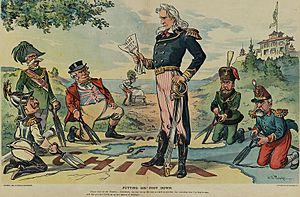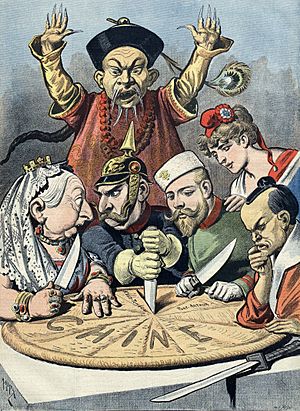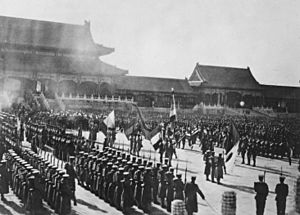Century of humiliation facts for kids
Quick facts for kids Century of humiliation |
|||||||||||||||
|---|---|---|---|---|---|---|---|---|---|---|---|---|---|---|---|
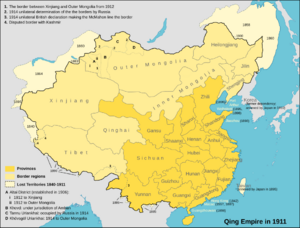
Territorial losses of the late Qing dynasty due to annexations by foreign powers
|
|||||||||||||||
| Traditional Chinese | 百年國恥 | ||||||||||||||
| Simplified Chinese | 百年国耻 | ||||||||||||||
| Literal meaning | 100 years of national humiliation | ||||||||||||||
|
|||||||||||||||
The century of humiliation (Chinese: 百年国耻, meaning "hundred years of national disgrace") was a difficult time in Chinese history. It started around 1839 with the First Opium War. This period is seen as ending in 1945 when China (then the Republic of China) became one of the "Big Four" powers after World War II. It also ended when China became a permanent member of the United Nations Security Council. Some people say it ended in 1949 with the founding of the People's Republic of China.
During this century, the Qing dynasty and later the Republic of China faced many problems. They suffered defeats, their country was divided, and foreign countries often interfered. This led to parts of China being taken over or controlled by Western powers, Russia, and Japan.
The idea of this period as "humiliating" grew stronger in China. This was especially true after Japan made the Twenty-One Demands in 1915. It also grew after China felt unfairly treated in the Treaty of Versailles in 1919. Both the Kuomintang (Nationalist Party) and the Chinese Communist Party used this idea in the 1920s. They protested against unfair agreements called "unequal treaties" and the loss of Chinese land to foreign control. The term became very common during the Second Sino-Japanese War (1930s-1940s) when Japan invaded China. Even though these old treaties are gone, this period is still a very important part of Chinese nationalism today.
Contents
A Difficult Time for China

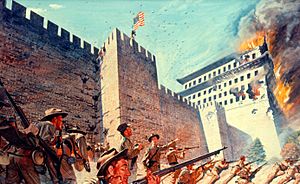
Chinese people in the 1920s and 1930s saw the "Century of Humiliation" starting in the mid-1800s. This was when the Qing dynasty began to fall apart, just before the First Opium War.
China lost many wars and was forced to make big deals with powerful foreign countries. These were called "unequal treaties" because they were very unfair to China. China often had to pay huge amounts of money, called war reparations. It also had to open its ports for trade. Foreign powers also leased or took over Chinese land. This included places like Hong Kong to the British and Taiwan to Japan.
Here are some of the main defeats and events that were part of this difficult time:
- Opium Trade (1800s–1940s): Western countries, especially Britain, and Japan forced China to accept the trade of opium. This caused many problems for China.
- First Opium War (1839–1842): China lost to the British. This led to the British taking control of Hong Kong.
- Second Opium War (1856–1860): China lost again. British and French forces attacked and looted the Old Summer Palace, a beautiful imperial garden.
- Unequal Treaties: China was forced to sign many unfair treaties. Key examples include the Treaty of Nanjing, Treaty of Whampoa, Treaty of Aigun, and Treaty of Shimonoseki.
- Loss of Outer Manchuria (1858-1860): Through the Treaty of Aigun and Treaty of Peking, Russia gained a large area of land called Outer Manchuria.
- Sino-French War (1884–1885): China lost influence over Vietnam and other parts of Southeast Asia.
- First Sino-Japanese War (1894–1895): China lost to Japan. Japan took over Taiwan and gained control over Korea.
- Boxer Rebellion (1899–1901): An uprising against foreign influence was put down by the Eight-Nation Alliance (an alliance of eight foreign powers). China had to pay huge reparations, more than its yearly tax income.
- Russian Invasion of Manchuria (1900): Russia invaded Manchuria, leading to violence against Chinese people.
- Twenty-One Demands (1915): Japan made a list of demands that would have given it much more control over China.
- Treaty of Versailles (1919): After World War I, German territories in China were given to Japan, not returned to China. This angered many Chinese people and led to the May Fourth Movement.
- Japanese Invasion of Manchuria (1931–1932): Japan invaded and set up a puppet state in Manchuria.
- Second Sino-Japanese War (1937–1945): Japan launched a full-scale invasion of China, causing immense suffering.
How the Humiliation Ended
Some foreign powers felt that the terms of the Boxer Protocol in 1901 were too harsh on China. The U.S. Secretary of State, John Hay, created the Open Door Policy. This policy aimed to stop colonial powers from completely dividing China into colonies. It also tried to ensure that all countries could trade equally in China. This policy was meant to protect China's land but also allowed foreign trade.
Over time, China slowly regained its power. In 1943, the United Kingdom and the United States gave up their special rights in China. These rights, called "extraterritorial jurisdiction," meant their citizens were not subject to Chinese laws. After World War II, France also gave up its special areas in China in 1946.
Chiang Kai-shek, the leader of the Republic of China, said the Century of Humiliation ended in 1943. This was when all the unfair treaties were canceled. Mao Zedong, the leader of the Chinese Communist Party, declared its end in 1949 with the establishment of the People's Republic of China.
However, some Chinese leaders and writers have continued to say that the humiliation truly ended later. Some point to the Korean War, when Chinese forces pushed back UN forces. Others mention the return of Hong Kong in 1997 and Macau in 1999 to Chinese control. Even hosting the 2008 Summer Olympics in Beijing was seen by some as a sign of China's rise. Some Chinese nationalists believe the humiliation will not fully end until the People's Republic of China controls Taiwan.
In 2021, the Chinese government began to refer to the period as 120 years of humiliation. This refers to the 1901 Boxer Protocol, where China had to pay large reparations to foreign powers.
Why This History Matters Today
The idea of the "Century of Humiliation" is very important in how the Chinese Communist Party tells China's history. It is also a key part of modern Chinese nationalism. This history focuses on protecting China's "sovereignty and integrity." It has been used in discussions about events like the US bombing of the Chinese embassy in Belgrade and protests over Tibetan independence. Some experts say it is also used to respond to foreign criticism about human rights or to draw attention away from problems like corruption inside China. It also helps support China's territorial claims and its growing power in the world.
Similar Ideas in Other Countries
In 2019, India's Foreign Minister, S. Jaishankar, used a similar idea. He spoke about India's "two centuries of humiliation" under British rule.
See also
- Anti-Japanese sentiment in China
- Anti-Western sentiment in China
- Chinese Century
- Chinese concession of Incheon
- Foreign concessions in China
- Hurting the feelings of the Chinese people
- List of Chinese treaty ports
- List of treaties of China (1689-1949)
- Revanchism
- Scramble for China
- Sick man of Asia
- Territorial losses of Thailand
- Unequal treaties
- Western imperialism in Asia
 | DeHart Hubbard |
 | Wilma Rudolph |
 | Jesse Owens |
 | Jackie Joyner-Kersee |
 | Major Taylor |


